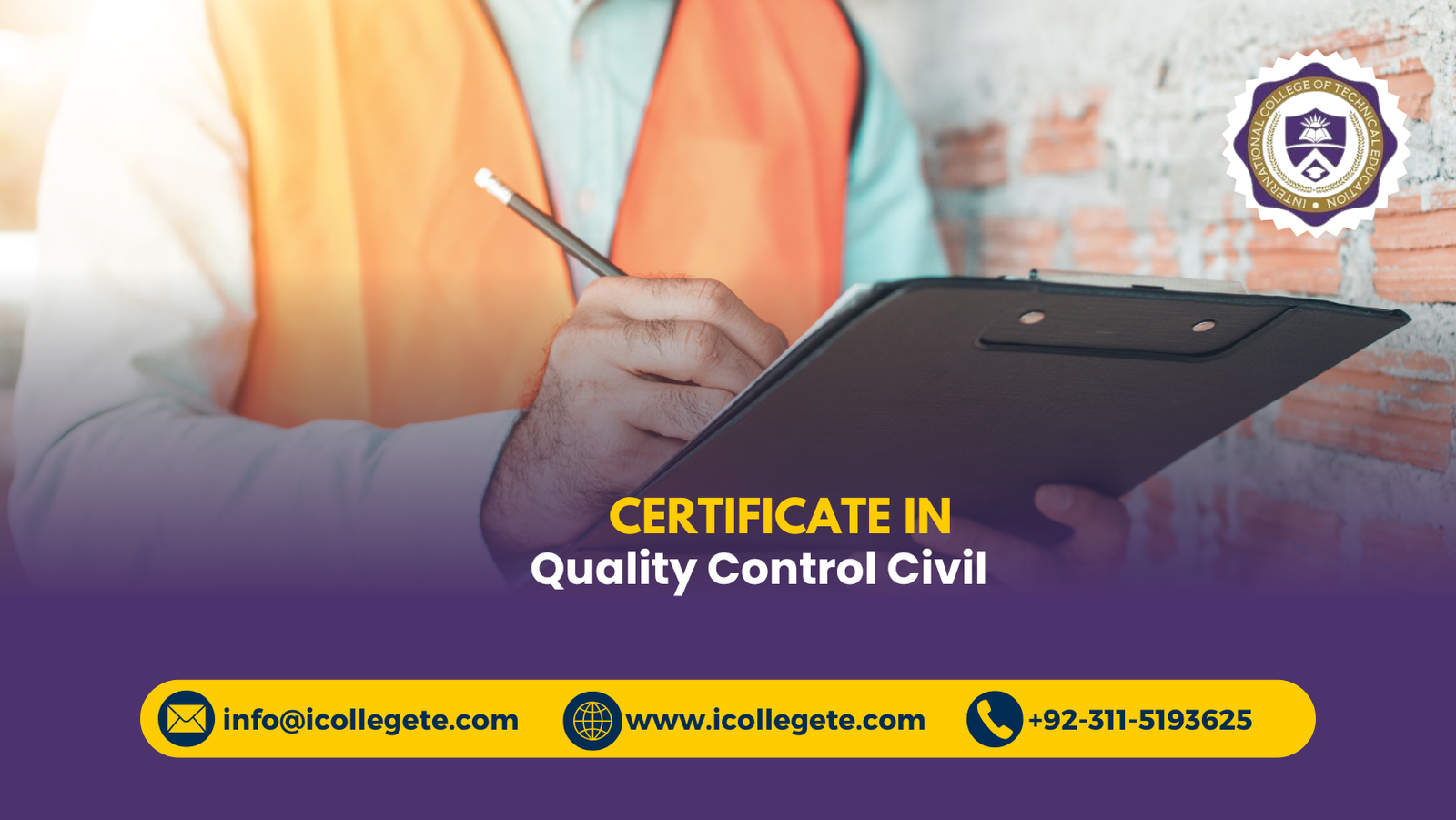The Quality Control Civil course in Jhelum is designed to provide learners with the technical knowledge and practical skills required to monitor and maintain quality standards in civil construction projects. With rapid growth in infrastructure and construction activities, the role of quality control professionals has become essential to ensure safety, durability, and compliance with engineering standards. Quality Control Civil course in Jhelum offers a comprehensive understanding of quality control techniques, inspection procedures, testing methods, and documentation processes used in the civil engineering field.
Participants will gain hands-on experience in inspecting construction materials such as concrete, steel, asphalt, and soil, using modern testing equipment and procedures. The Quality Control Civil course in Jhelum emphasizes practical application through case studies, lab activities, and fieldwork to help learners identify defects, conduct tests, interpret results, and follow corrective actions. It also covers quality assurance systems, standard codes, risk management, and continuous improvement practices.
Learners will explore industry standards and regulations that govern civil construction work, equipping them with the expertise to ensure each project component meets design specifications and legal requirements. Through interactive sessions, the Quality Control Civil course in Jhelum fosters analytical, problem-solving, and decision-making abilities, enabling participants to play a critical role in project success.
Whether you are new to the construction industry or an experienced technician looking to enhance your quality control capabilities, the Quality Control Civil course in Jhelum provides an ideal pathway. Graduates will be prepared to work on residential, commercial, and infrastructure projects, ensuring that construction activities meet quality benchmarks and contribute to the longevity and safety of built environments.
Course Overview
- Understanding fundamentals of civil quality control techniques
- Learning material testing and inspection procedures
- Developing skills in field monitoring and documentation
- Interpreting construction drawings and specifications
- Conducting laboratory and site-based tests on construction materials
- Ensuring compliance with standards and regulations
- Implementing quality assurance systems and reporting
- Enhancing defect identification and corrective action strategies
Course Study Units
- Introduction to Civil Quality Control Systems
- Construction Drawings and Specifications
- Material Testing: Concrete, Steel, Asphalt, Soil
- Site Inspection and Field Quality Monitoring
- Laboratory Testing Procedures
- Quality Assurance and Documentation
- Codes, Standards, and Regulatory Compliance
- Defect Analysis and Corrective Actions
- Risk Management in Construction Quality
- Continuous Improvement Techniques in Civil Projects
Course Learning Outcomes
- Understand quality control principles in civil construction
- Conduct inspection and testing of construction materials
- Interpret drawings, specifications, and project requirements
- Monitor site activities and ensure compliance with standards
- Implement quality assurance and documentation systems
- Identify defects and initiate corrective actions
- Apply laboratory and field testing procedures accurately
- Use modern testing tools and equipment effectively
- Manage risks associated with construction quality
- Enhance problem-solving and analytical skills
- Maintain quality throughout the project life cycle
- Ensure durability and safety of construction work
- Contribute to cost-effective and efficient project delivery
- Work collaboratively with site teams and engineers
Entry Requirements for this course
- Minimum education of high school or equivalent
- Basic understanding of construction or engineering concepts
- Interest in civil quality control and inspection roles
- Ability to participate in field and lab activities
- No prior experience required but advantageous
- Good communication and observational skills
- Willingness to learn testing tools and procedures
- Commitment to completing study units and assessments
- Attention to detail and accuracy in inspections
- Problem-solving and analytical mindset
- Motivation to pursue a career in civil quality control
- Ability to follow construction safety and quality rules
- Capacity to work in outdoor project environments
- Willingness to maintain documentation and reports
Course Benefits
- Comprehensive knowledge of civil quality control practices
- Practical skills in material testing and inspection methods
- Increased employability in construction and civil sectors
- Enhanced ability to ensure compliance with standards
- Exposure to field and laboratory testing procedures
- Development of problem-solving and decision-making skills
- Preparation for roles in quality assurance and site inspection
- Improved understanding of construction drawings and specifications
- Ability to prevent defects and ensure project quality
- Hands-on experience with modern testing equipment
- Career advancement opportunities in civil engineering projects
- Contribution to safety, durability, and project efficiency
- Knowledge of continuous improvement techniques
- Professional credibility in civil quality control
Why someone choose this course
- To gain expertise in quality control techniques for civil construction
- To develop practical testing and inspection skills in materials
- To enhance career prospects in civil and construction industries
- To ensure compliance with engineering standards and regulations
- To reduce defects and improve construction quality
- To become proficient in field and laboratory testing procedures
- To contribute to safe, durable, and efficient construction projects
- To improve analytical, problem-solving, and decision-making abilities
- To manage quality documentation and reporting professionally
- To prepare for quality assurance roles in major infrastructure projects
- To support continuous improvement and risk management efforts
- To gain hands-on experience with modern equipment and standards
- To achieve recognition as a skilled civil quality control professional
- To adapt to the growing demand for high-quality construction technicians
Who can enroll in this course
The Quality Control Civil course in Jhelum is ideal for fresh graduates seeking to enter the construction industry with a specialization in quality control and inspection. Quality Control Civil course in Jhelum is also suitable for technicians, foremen, and site supervisors who want to enhance their ability to monitor construction quality and ensure materials and workmanship comply with design specifications. Quality Control Civil course in Jhelum provides essential skills for individuals aiming to take on technical roles in construction projects.
Professionals currently working in building, road, bridge, or infrastructure projects who wish to advance their careers by gaining formal training in quality practices will find the Quality Control Civil course in Jhelum highly beneficial. Quality Control Civil course in Jhelum adds value to civil engineers, draftspersons, and project coordinators by equipping them with inspection, testing, and quality documentation skills that are vital on site. By understanding quality assurance systems, these professionals can contribute more effectively to successful project delivery.
Those looking to transition to construction consulting or supervisory roles can also take advantage of this comprehensive training. Quality Control Civil course in Jhelum prepares learners to handle responsibilities such as site inspections, laboratory tests, reporting, and compliance checks while working for contractors, consultants, or regulatory bodies. The practical components of the Quality Control Civil course in Jhelum ensure learners are prepared to handle real project challenges confidently and professionally.
Additionally, Quality Control Civil course in Jhelum welcomes individuals from related technical backgrounds such as geology, environmental science, and surveying who wish to broaden their expertise and pursue a career in construction quality control. With a strong focus on both theoretical knowledge and hands-on application, the Quality Control Civil course in Jhelum builds learners’ confidence, making them capable of maintaining high construction standards and contributing to the overall safety and longevity of civil structures.
Future Progression for this course
- Eligibility for advanced civil quality control and testing certifications
- Career growth in construction, infrastructure, and engineering sectors
- Opportunities for supervisory roles in quality inspection and assurance
- Development of skills for consultancy in civil project quality management
- Preparation for roles in government, private, and international projects
- Ability to specialize in material testing laboratories or site quality control
- Enhanced prospects for working with multinational construction firms
- Progression into civil quality engineer positions
- Involvement in large-scale infrastructure development projects
- Improved technical expertise and problem-solving skills
- Opportunities for continuous professional development
- Ability to manage project quality lifecycle independently
- Contribution to safer, durable, and high-quality structures
- Pathway to leadership within construction quality management






